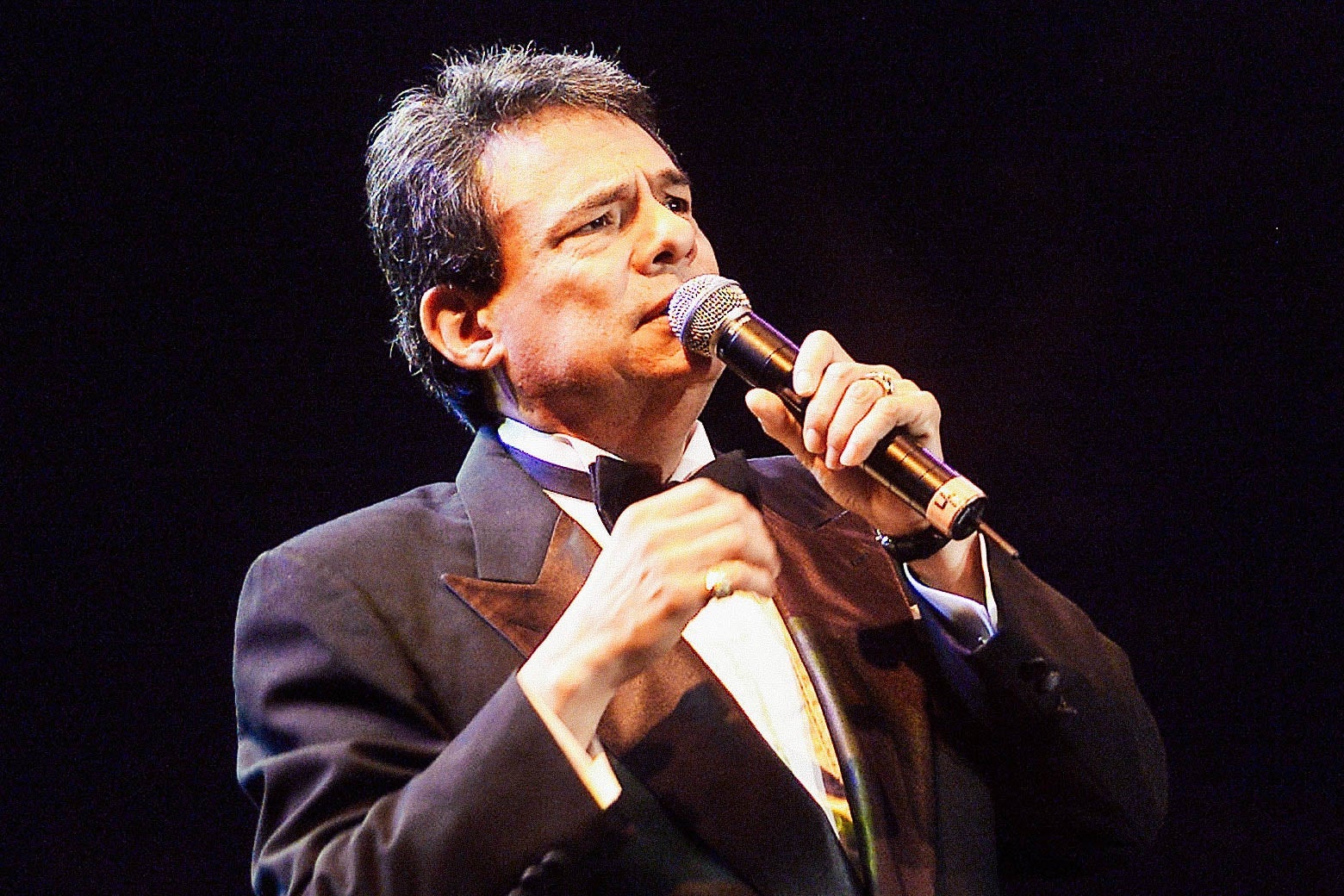Almost 50 years ago, in early 1970, a young artist took the stage in Mexico City for a singing competition called “Festival de la Canción Latina.” Dressed in a dramatic double-breasted green jacket with white frills peaking from the sleeves, he walked confidently toward the microphone. Red garlands from the audience fell around him even before the first notes began to play. The song—“El Triste” (The Sad One), a melodramatic lament by legendary Mexican songwriter Roberto Cantoral—required a powerful delivery. On that night, it got one and then some.
“How sad it was to say goodbye just when we loved each other so,” the young man sang, elongating the last syllable with theatrical flair, mournfully closing his eyes. “El Triste” allowed the singer a few moments of purring respite, only to rise up again, extending his range to the limit. Through it all, he barely moved from the center of the stage, hinting at a certain bashfulness. When the song ended, to a standing ovation that a music critic who was present once described to me as “an earthquake,” the singer flashed a boyish smile. At 22, he seemed to be less of a natural showman and more a starry-eyed idealist with an uncanny ability to sing, with a steadiness worthy of a tenor, of desperate love.
He would soon grow into a star.
José José, who died last week in Miami at the age of 71, was the most influential crooner in Latin music’s modern history. Born José Rómulo Sosa to a concert pianist mother and an opera tenor father, José began singing in small nightclubs and restaurants in Mexico City. His love of popular songs was an act of rebellion against his father, who had long insisted that his son focus solely on classical music and abandoned the family when José was barely a teenager. By the late 1960s, after adding one more “José” to his name in honor of his absent but artistically influential and demanding father, José José quickly gained notoriety. After his historic performance of “El Triste,” he paired his unique voice with an inspired thematic choice: He would fashion himself as an icon of romantic angst.
Over the next quarter century, José José became remarkably prolific. He produced a record a year from 1977 until the late ’90s, each of them a blockbuster combination of longing and platonic courtship. Mostly, José José sang of the paralyzing terror of amorous loss. In “Si Me Dejas Ahora,” a tear-jerker of a song from 1978, he flatly declares: “If you leave me now, I won’t be able to survive/ You chained me to your skirt, and taught my soul to depend on you.”
José’s absolute melancholy, which at times seems more evocative of orphanhood than romantic absence, would make him wildly popular in Mexico and Latin America. In “Me Basta,” José sings, “I’d settle for a little of your love/ Whatever you’ve kept hidden/ What no one has wanted/ It doesn’t matter to me.” Sometimes, he could take his fondness for helplessness to distressing extremes. Take “Desesperado,” a plangent song about a “broken man” pleading for his partner to return. “I don’t care if you have sinned,” José José implores. “I beg you, come back/ I am desperate/ I will agree to anything.”
However melodramatic, José Jose’s ballads struck a chord. Over the years, his voice shepherded heartbreak and reconciliation alike. More than that, throughout the past 40 years, José José’s enormous catalog would become an omnipresent soundtrack for Mexican life. I remember humming along to his latest record while I sat, surrounded by family, in my grandparents’ living room. He was there on the radio when I left for school every morning and, years later, on one of the first mixtapes I made for a girlfriend. His voice was soothing. José José offered reliable solace.
José’s own life was different. He fought substance abuse from an early age. Despite enjoying remarkable professional success, his 30-year struggle with alcoholism spiraled into destitution. “It was a slow suicide,” he would say of the time he had been forced to live inside a taxicab in southern Mexico City. “People used to call us on the phone to tell us they had seen him lying on the street,” Jose´s eldest son, José Joel, would later recall. In a drunken stupor, José José would disappear for days. Rumors of the singer’s death became commonplace. His family had to field calls asking them to identify José’s supposed body at a local morgue. After years of binges and abandonment, he eventually achieved sobriety. But decades of abuse had taken a toll: Mexico’s most prodigious singer had lost his voice, literally. After a series of ailments, José José could never conjure the same choral magic again.
Even in death, controversy has disturbed José José. After learning of his passing, from pancreatic cancer, José Joel and Marysol, his two eldest children, demanded to see their father’s body. Sarita, José’s youngest child who is also an aspiring singer, apparently refused, fueled by a long-standing and bitter feud between the siblings. After the intervention of mutual friends, all three of José José’s children embraced and agreed to have the singer’s remains flown to Mexico City. There, in the city where he has been hailed as “the prince of song” for half a century, José José will lie in state in the beautiful Palacio de Bellas Artes. Thousands will likely flock to say goodbye.
As always when it comes to the man, music will be heard, and tears will be shed. He would have it no other way.
